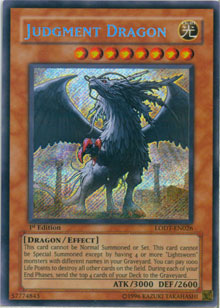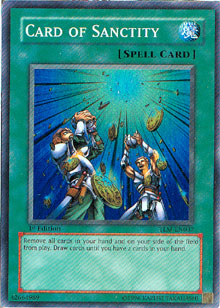Last week I wrote about a few things I felt that floor judges needed to know about working a premier event. My experience doesn’t stop there, though. I have had the privilege of being a head judge at premier events as well. I must confess that my head-judging experience is limited to Regional qualifiers, but I think this advice applies to running Shonen Jump Championships too. Let’s get started.
 Judge Tip #1: You Are the Boss
Judge Tip #1: You Are the Boss
I think the most difficult lesson to learn about being a head judge is that you are running the show. You are responsible for the actions of your judge staff and scorekeeper, as well as your own. Your rulings are final and not even the tournament organizer can overrule you: this puts you in a special position of responsibility, reserved only for those who can handle it.
Being a head judge is a lot like being a restaurant manager. You mediate conflicts, oversee your staff, and ensure that everything gets done quickly and on time. The success of a premier event lies in your ability to manage your staff as well as their ability to perform their duties as assigned. With this much responsibility, it’s easy for it to go to your head or for you to buckle under the pressure. Many tournaments go sour when a head judge feels that he or she is entitled to be a bit cocky. On the opposite side, the head judge may not feel adequate to the task of running the event. You are the boss for this one given tournament, and you need to be the most level-headed person in the room.
Judge Tip #2: Know Your Roles
As a head judge it’s better if you are aware of (and know how to perform) all the duties of those who report to you. Why? Two reasons: first, you’ll have a better understanding of what each job entails. When you start handing down orders, it helps if you have some experience being a scorekeeper, deck-check team member, or results slip specialist. Second, it gives you empathy for what they have to do. It’s a system of checks and balances so that you know when you’ve gone too far. Each tournament job has different pressures and realities. This is something you should be keenly aware of whenever you decide to issue instructions.
Judge Tip #3: Understanding Your Management Style
Each person brings with him- or herself a unique style of management. Some can be dictators while others can be benevolent leaders. Some play devil’s advocate while others simply play the "good guy." Obviously some styles are worse than others. I’ve had to work under "dictator" type head judges and it’s not fun at all. I’ve also worked under some who are simply too soft to issue any kind of real penalties or disagree with players. They buckle under the pressure. Being aware of your own management style is helpful because it makes it easier to determine how your staff will respond to your leadership. If you’re too much of a "nice guy," then you better make sure you have the right staff. Often, some staff members will try to walk all over you. Those who are more strong-willed don’t often like to work under someone who hasn’t earned their respect. You have to be careful with that. If you are more of a "dictator" type of leader then you’ll have problems with those who aren’t like you. They may not like blunt orders or concise instructions. You have to apply a certain finesse to your speech so you don’t stir up resentment among your crew.
Understanding your style is one thing, but it also takes work to apply it to different staff rosters and improve it along the way. My style is not unique, but I try to keep it as simple as possible. It works best when I have the right staff. Fortunately, I’ve had the privilege of working with the same set of ten to fifteen people for the last three years. My management style can be summarized by the following sentence: "I’m happy as long as you know what you are doing and you are performing as well as you can." Why does this work for me? Because I’m not a good micro-manager. I don’t like nit-picking because it annoys people. Heck, it annoys me. I like working with staff who know what they are doing and can take responsibility for their own actions. If my staff knows what they have to do and how to do it, then it makes my job much simpler.
The head judge’s job is largely to oversee, not to get involved in every little thing. My style works best with a staff that takes pride in its expertise and each person can fend for him- or herself in 90% of situations. The other 10% is my job: appeals, disciplinary measures, settling disputes, and other such issues. I am very firm when I have to be, but I try to be courteous and pleasant the rest of the time. I’m very easy to get along with and my staff tends to like me. On the other hand, my style may not work well for you. It depends on your personality. You may be a straight-arrow/by-the-book type of leader and that’s okay. Also, you may be a well-intentioned altruist who hates to impose on others. Each is perfectly fine, but your bread and butter is your staff and your ability to direct them.
 Judge Tip #4: Respect Is Your Currency
Judge Tip #4: Respect Is Your Currency
The reason I say that respect is your currency is because it gets the event run smoothly. If your players don’t respect you, you’re cooked. If your staff doesn’t respect you, you’re cooked. Quietly, but firmly, you must demand respect through your words and actions. Remember that the player/judge relationship is often adversarial. Your typical boss/subordinate relationship is the same way. Sometimes your floor judges will resent the fact that you get to oversee the event and don’t have to deal with walking the floors all hours of the day. They may not like the fact that you decide when they get lunch (that’s a duty they don’t tell you about in the policy docs). They may not like that you are the boss, period. They may feel that they can do a better job than you. They may not agree with your rulings or how you direct them to perform tasks. Don’t kid yourself: these types of hidden resentments are very real. The next time you’re a floor judge you’ll understand completely, I assure you.
To complete the currency analogy, when your staff and players run out of respect for you, you’re done. Respect is something you want to have a lot of, much like money in the bank. When you’re broke, will you have a tough time? Of course. When you don’t have any respect "in the bank" your job is going to get very tough. More mistakes will be made either on purpose or by accident. Less care will be taken with rulings and even capable, hard-working judges may get lazy. You might be lucky enough to get a staff that is so effective and efficient that you won’t really need to worry if they don’t have any respect for you. If you are that lucky, then they definitely won’t recommend you as a leader the next time. With all this talk about respect I’m sure the question of how to gain it has occurred to you. How do you earn it? I only have a few words on that: self-confidence, respect for your staff, and a willingness to do what you direct your staff to do. "Lead by example," as they say.
I’m positive this short guide will be of great help to prospective head judges and current head judges. Thanks for reading! Have a great weekend!
—Bryan Camareno